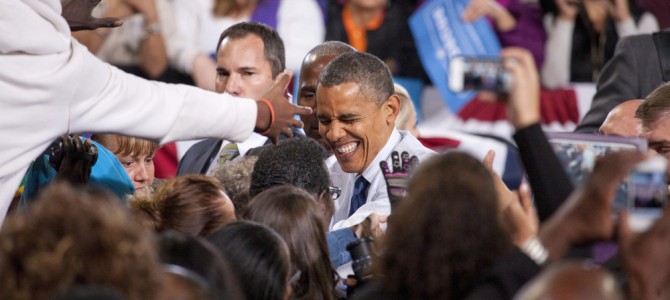
“Can I do it with joy in my heart?”—that’s the key question Jeb Bush said he had to answer before deciding to run for president. His heart said yes, apparently, and it’s still saying yes—he swears!—despite incessant alpha-male gibes from Donald Trump, anemic poll numbers, and the recent emergency Bush-family confab to stanch the bleeding.
Even so, you could be excused for suspecting that Jeb protests too much. “Low-energy guy?” Far from it, the former Florida governor insisted in a recent Time magazine interview. Actually, he’s, er, a “joyful grinder”: “I’m doing this. I’m working hard—I’m working 16 hour days. And I do do it joyfully, for sure.” For sure. Fake it ’til you make it, like they say in the self-help books. (Somewhat cruelly, Time accompanied the “joyful grinder” interview with a news analysis titled: “What’s Eating Jeb Bush?”)
But Jeb’s dilemma isn’t entirely self-imposed. Affecting positive attitude has become compulsory in the modern presidential campaign. Hardly a week goes by without reporters needling the contestants: Are you having fun yet?
It’s not clear why Americans should care. The presidency is supposed to be a serious job—does the person for that job really need to be as bubbly as a “Fox and Friends” host? Yet we seem to demand a level of giddy enthusiasm in presidential contenders that we’d recoil from if displayed by our financial planner or heart surgeon.
The Best Power-Wielders Resist Power
There was a time, however, when we approached presidential selection with the sobriety a serious choice demands. In a penetrating 2003 article, “The Joy of Power: Changing Conceptions of the Presidential Office,” political scientist Richard J. Ellis explains that Americans used to look for a very different demeanor when assessing potential presidents.
“In the beginning,” Ellis writes, “the presidency was envisioned not as an office to be enjoyed, but as a place of stern duty.” In fact, “one would be hard-pressed to find a single president between George Washington and Grover Cleveland of whom it could be said that he appeared to have fun in the exercise of presidential power.”
Early American political culture took it as self-evident that anyone who seemed to relish the idea of wielding power over others couldn’t be trusted with it. Our first president set the standard for presidential bearing: “dutiful and reluctant.” As Washington put it: “I can truly say I had rather be at Mount Vernon with a friend or two about me than to be attended at the Seat of Government by the Officers of State and the Representatives of every Power in Europe.” Or, as Cleveland once moaned, “My God: what is there in this office that any man should want to get into it?”
Throughout the nineteenth century, the public norms surrounding political power mandated a “low-energy” campaign, in which the candidates “stayed home in dignified silence, ready to serve if called by the people.” Even Andrew Jackson, the first candidate to style himself the champion of the popular will, refused to hit the hustings: “I meddle not with elections; I leave the people to make their own president,” he said.
You’d never catch that guy grinning, nor, prior to the twentieth century, any of the others. In the popular images of nineteenth-century presidents, Ellis writes, “it is difficult if not impossible to find an exuberant or smiling president.”
Enter the Self-Styled Larger than Life
Over the course of the twentieth century, thanks in part to the two Roosevelts, cultural norms shifted, even as the executive branch grew radically in size and power. “Presidents today are supposed to take pleasure in the job,” Ellis writes, and be happy warriors on the campaign trail. “Those who dislike or at least complain about it are assumed to be psychologically suspect.”
Shouldn’t it be the other way around? Ambivalence toward the responsibilities of power and the demands of modern campaigning ought to be considered evidence of a candidate’s mental health. Yet, perversely, we’ve decided that anyone who reveals too much of that quality need not apply.
A latter-day Cincinnatus might put down his plow in the hour of his country’s need; he’s not going to sign up for a two-year ultramarathon of pleading with high-dollar donors, glad-handing his way through primary states, and saying things no intelligent person could possibly believe. Instead, we get the sort of person who wants presidential power badly enough to do what it takes to get it, 16 hours a day, feigning joy all the while.
At least, we should hope it’s feigned. Anyone who approaches “the process” with genuine joy in his heart is a maniac who should be kept as far away from “kill lists” and nuclear weapons as possible.
Meanwhile, the cult of campaign-trail positivity is becoming so absurd that even the candidates are starting to snark about it. Last month, when a reporter asked Sen. Rand Paul if he was enjoying the campaign, Paul cracked: “I love it. We’re thinking about putting out smiling emojis in all our emails. Do you think that would help?”
And, for a second there, at a recent New Hampshire presser, Hillary Clinton seemed almost human, unleashing a spurt of sarcasm when asked whether she considered herself a “joyful candidate. “I do,” Clinton deadpanned, stepping away from the podium: “Off we go, joyfully,” then turning back and snapping her fingers: “Let’s get some joy going.”
Actually, let’s not. We’re not enjoying this. Why should they?








